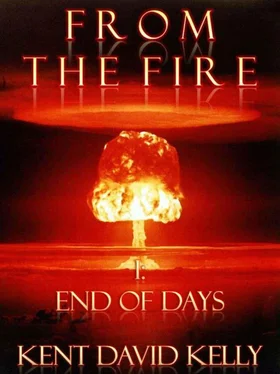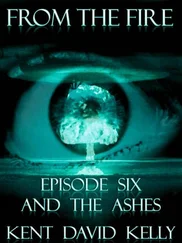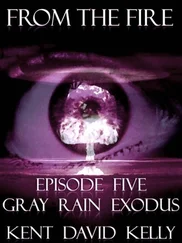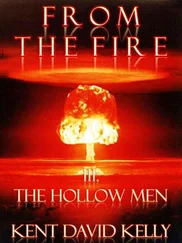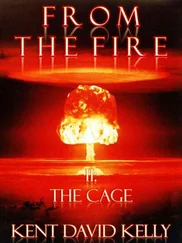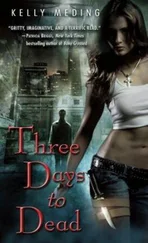Because what if the lights go out?
Something made her think, “Grid priorities,” but she could not remember what that might mean. She knew only that she was hyperventilating, freezing despite the warm gushes of air, and close to shock. The terror-drone in her mind was filtering the mantra Get to the shelter, get to the shelter into Don’t get caught in the dark , and that was all.
Don’t. Calm. You need to think, Sophie.
Time refused to accelerate. She seemed to drift, to release herself into a thin fleshly resonance of activity of response.
Think!
She did not know how many of the shelter’s systems were automatic, or what more she would need to do to survive. She only knew that all of Tom’s emergency manuals were stacked in the binders on the utility shelves by the entryway, where they could be quickly accessed if the light had failed to come on. The racks of shelves loomed over her, bolted into the interior-facing wall.
One of the ceiling lights just above the left-hand bank of shelves refused to stop flickering. It strobed fluorescent washes of ice-light down over Sophie’s glistening face. She stared at it, then gasped as a keening squeal announced that the vault door behind her had finished pressurizing.
What if I never get out of here?
She looked up at the walls of the cluttered entryway, up at the aluminum shelving filled with the binders and CD-R spools, over the fuel barrels all stacked beneath their oily tarps. Shivering, hugging herself and biting her lower lip to keep from crying out, Sophie edged her way beyond the claustrophobic entry and deeper into the shelter proper.
She had not seen the “great room” since her last tour with Tom, three years ago. She could see where the thousands of labored hours had gone, hours she had complained about more times than she cared to remember. Over the years Tom’s weekend hobby had quickly become an obsession. Whenever he came back home from working in Virginia or in NORAD, he had been here. When he came back to “the mountain” he always invited her to come along, and nine times out of ten she had refused to join him. Now, regarding all of his accomplishments and standing there in a haunted nothingness of sanctuary, Sophie could hardly recognize the shelter she had once endured and secretly despised.
The great room was fifteen feet wide and thirty feet long, an “underground mansion” according to Tom. The reinforced ceiling with its interlaced girders was new to her. She cringed, fighting the urge to cower beneath the rectangular grids of light. The girdered reinforcement, with all of the plastic water cylinders and canvas bundles stacked up there in netted rows against the roof, made the great room’s ceiling seem even lower than before. The room stood filled up on every side with plastic-covered stacks of supplies lined up in labeled and fluorescent containers: generator fuel, meds, glo-sticks, flares, matches, recycled paper.
And what was that strange contraption, an iron spider-like thing standing inside a square concrete tub that looked like some kind of shower-stall? Some kind of advanced water pump? What was the purpose of the two-by-two square of aluminum sinks set into the concrete floor?
Time was speeding up again. She had a sense that precious seconds were ticking away.
Away to what?
But her shivering selflessness would only let her think: Don’t make me stay, stay so long in here, that I learn everything before the end. Sophie balled her fists together in an effort to stop her fingers from shaking. Don’t make me.
She could hear the main generator humming away in the back room. Two ceiling fans were whirring, casting geometric shadows across the metal shelves. The translucent plastic seal over the doorway into the next room beckoned her further on, but there was a disturbing alien cast to the light that was glowing from inside that pressurized chamber, as if its seal were some kind of spider-web or the mouth of a Venus flytrap, its interlocking plastic fingers beckoning her to come inside.
Forever.
Alone. I could alone here, forever.
Why haven’t the missiles fallen?
How much time has passed?
She had no idea. The seconds were become tenuous once more, breaths were becoming hours.
She struggled to remember what Tom had told her on the phone, before, before . His brother Mitch was with Lacie, he had said, in the place . The place? Surely, Tom had spoken in code because he knew that if he had given an address or some other identifier, the Air Force security personnel would have killed him for the breach. And what would they have done to Lacie, if there was time?
“Oh, Tom.”
None of that mattered now.
The place. The date? She needed to remember what that could be.
Call Mitch.
And how was she supposed to do that?
She pressed her fists against either side of her head, and her hands spread open across her cheeks. To silence her thoughts, to focus, she spoke into the silence. She meant to say something slight, calming, but what she heard was this:
“Do I want to live?”
And inside her, No. Oh, Tom. Oh, no.
Don’t make me.
“Lacie,” she whispered, already afraid to hear her own voice reverberating within this sterile tomb.
Lacie is alive and she’s with Mitch. I need, I need to find her. She’s out there somewhere, somewhere safe. Think of Lacie. Live for Lacie.
The last words she spoke before the missiles came down were these: “Tom, I’m so scared.”
But there was no reason to speak at all. There was no one to answer her, and perhaps there never would be.
Without the radio, the daylight, the snow, the pulses of fleeting cloud and falling water, Sophie had lost all familiarity with time. She had entered the shelter and beheld the great room. Two minutes had passed in an all-consuming drowning wave, a series of frantic impressions that felt like years.
She remembered Tom grimly saying—once and never again—that there would be no clocks within the shelter, that installing one would lead to “dark thoughts” which he refused to give any life to.
Sophie began to understand that perhaps two minutes had passed since she had entered the shelter, but it could have been two hours, two years, two lifetimes.
(The narrative is fractured here, for Sophie herself was not certain what she remembered.
And the truth is this: as Mrs. St.-Germain spoke her last recorded words upon Zero Day, three Russian R-36 Intercontinental Ballistic Missiles, each with a payload of ten warheads and thirty penetration drones, impacted in intersecting clusters, a triad of interlocking rings of death and fire, raining down over the entire Denver metro area. In forty-three seconds three million people died, the skin peeling away in shock-blasts and burning to vapor in the air, their eyes melting down their cheeks, their teeth turning to black and powdered glass.
The Rocky Mountains were a wall, a granite bastion separating American humanity into two fated tribes for the wrath of Holocaust: those to the east, of the plains, who burned and died quickly; and those to the west, of the spires, who died slowly and far more horribly. This we know of the region of Black Hawk, and little else. From other testaments I have reconstructed all I can; the diary of St.-Germain shall tell us a little more.
~ S.-G.C.)
Impact.
However long Sophie had stood within the shelter, that eternity ended as she spoke the words “So scared.” In that moment, she felt a shock like an invisible thunderbolt all over her body. Her flesh rippled with the impact, her hair whirled up in coils, her tongue peeked out as her cheeks were pushed by the shockwave into a wild rictus of a grin. Then the world entire was flung sideways.
Читать дальше
